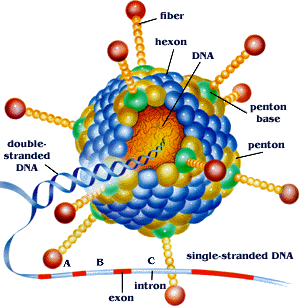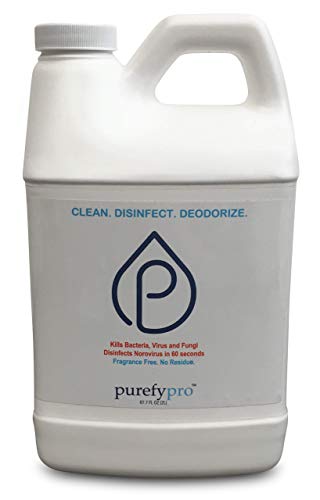Adenovirus
Adenoviruses, of which there are over 50, can cause a variety of illnesses ranging from mild respiratory disease, to very painful eye infections, diarrheal illnesses, rashes, and even life-threatening infections in those who are immune compromised. The number of cases of Adenovirus infection are not regularly tracked since many cases will go undiagnosed, but these infections are considered to be very common throughout the life span, although they may be more common in younger people as they would be less likely to have prior exposure and any level of immunity. Adenovirus infections cause significant lost days of work and school and are certainly an infection worth preventing.
Symptoms of Adenovirus Infection
Because Adenoviruses can cause such a wide range of infections, the symptoms vary widely as well. Any of the following could be caused by various Adenoviruses:
- Colds
- Sore throat (pharyngitis)
- Bronchitis
- Pneumonia
- Diarrhea
- Pink eye (conjunctivitis)
- Fever
- Bladder inflammation or infection (cystitis)
- Inflammation of stomach and intestines (gastroenteritis)
- Neurologic disease
The only way to know for certain that an Adenovirus is causing any particular illness is to be tested by a physician using special cultures or other diagnostic procedures not always available in all areas.
Who Gets Adenovirus?
Literally anyone could be infected with Adenoviruses. Infants, young people, and people with weakened immune systems or existing respiratory or cardiac disease are at higher risk of getting sick from an adenovirus infection..
How Is Adenovirus Spread?
Adenoviruses are usually spread from an infected person to others through:
- close personal contact with an infected person, such as touching or shaking hands
- the air by coughing and sneezing
- touching an object or surface with adenoviruses on it then touching your mouth, nose, or eyes before washing your hands
Some adenoviruses can spread through an infected person’s stool, for example, during diaper changing. Adenovirus can also spread through the water, such as swimming pools, but this is less common.
Preventing Adenovirus Infection
There is no vaccine against Adenovirus infection that is available to the public, although some military recruits might receive one, so other precautions must be taken. In addition to good hand hygiene and not touching your eyes, nose, or mouth with hands that might be contaminated, surface decontamination is an essential means of combating Adenovirus infection. This is especially important in childcare settings since children are frequent carriers of Adenovirus. Infectious disease professionals recommend the frequent cleaning and disinfection of hands as well as potentially contaminated household surfaces and objects such as toys and other items that may become contaminated with nasal secretions or fecal material and then end up, directly or indirectly, in the mouths, noses, or eyes of others. Essentially, anything a child under the age of 5 can reach and touch is potentially infected with adenovirus at some point, and that contamination can spread very easily via adult hands.
Challenges in Selecting a Cleaner and Disinfectant
But a challenge exists for anyone concerned about eliminating or reducing adenovirus in the household or daycare environment since it isn’t always possible to know with certainty that the cleaner or disinfectant being used will be effective against adenovirus. Even cleaners that claim to be effective “against 99% of germs” are not necessarily effective against adenovirus, and it is important to know exactly which germs constitute the set of 99% being measured against. Labelling requirements don’t always require manufacturers to disclose exactly what their cleaners are effective against, nor do they necessarily have to say what measures they are using to make such claims. Ideally, you should choose a cleaner and disinfectant that has been tested and certified as effective against adenovirus by the United States Environmental Protection Agency (EPA). This provides your only certainty that the cleaner and disinfectant you choose will always be able to kill adenovirus when used as directed. But how do you find such a highly tested and certified cleaner and disinfectant given the extreme difficulty and expense in meeting the EPA requirements? What products have bothered to undergo such scrutiny?
CleanerToday Has the Solution to Your Adenovirus Concerns
Fortunately, selecting a cleaner and disinfectant that has undergone the strict EPA testing and certification process is easy when you work with the good folks at CleanerToday.com through their easy to use and up to date website. They offer several variations of the Viraguard family of products, all of which are EPA tested and certified as effective against adenovirus on both human hands and on environmental surfaces. Viraguard handwipes easily clean and disinfect hands as well as small shared surfaces around the house and on the go, including such items as shopping cart handles, door knobs, and even airline seat armrests to mention just a few. The handwipes are packaged for single use, are easily transportable, lightweight, and allowed everywhere. For larger or more frequent cleaning jobs around the house or especially in daycare settings, Viraguard is available in a gallon bulk size that is very economical and easy to use. You simply spray, wipe, and adenovirus contamination is gone just like that. Nothing could be easier and there is no cumbersome dilution required. Viraguard arrives ready to use and ready to eliminate dozens of potentially disease causing organisms, including bacteria, viruses, and fungi, all in one wipe, as tested and certified by the EPA. If you have concerns about personal or environmental contamination with potentially dangerous organisms, visit CleanerToday.com right away for quick and easy solutions to these potential problems. Give them a try today!


